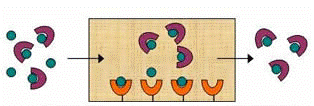Chemistry, Department of: Faculty Series

David Hage Publications
Document Type
Article
Date of this Version
11-5-2010
Citation
Published in final edited form as: J Pharm Biomed Anal. 2010 November 2; 53(3): 811–818. doi:10.1016/j.jpba.2010.04.035. Version presented here is from NIH PubMed Central.
Abstract
Diabetes leads to elevated levels of glucose in blood which, in turn, can lead to the non-enzymatic glycation of serum proteins such as human serum albumin (HSA). It has been suggested that this increase in glycation can alter the ability of HSA to bind to drugs and other small solutes. This study used high-performance affinity chromatography (HPAC) to see if there is any significant change related to glycation in the binding of HSA to warfarin and L-tryptophan, which are often used as probe compounds for Sudlow sites I and II of HSA in drug binding studies with this protein. It was found through frontal analysis studies that both of these compounds gave a good fit to a single-site binding model with glycated HSA under the conditions used in this study. There were was no significant change in the association equilibrium constants or specific activities for warfarin with HSA at pH 7.4 and 37°C under glycation conditions that were representative of those expected in pre-diabetes or diabetes, but a 4.7–5.8 fold increase binding affinity for Ltryptophan with glycated HSA was observed. These results indicate that warfarin and Ltryptophan can be successively used as site-selective probes for glycated HSA; however, changes in the affinity of L-tryptophan may need to be considered in such an application. These results should be valuable in future competition studies using these compounds as probes to examine the interactions of other drugs and solutes with Sudlow sites I and II and to determine how changes in HSA glycation can affect the serum protein-binding of various pharmaceutical agents during diabetes.


Comments
Copyright Elsevier Inc. Used by permission.